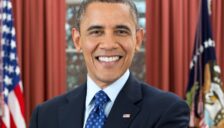Vanity Fair:
OBAMA: It’s always dangerous to amend the words of Abraham Lincoln, but let me see if this is a friendly amendment. I actually think, when you’re young, ambitions are somewhat common—you want to prove yourself. It may grow out of different life experiences. You may want to prove that you are worthy of the admiration of the demanding father. You may want to prove that you are worthy of the love of an absent father. You may want to prove that you’re worthy of other kids or neighbors who were wealthier than you and teased you. You may want to prove that you’re worthy of high expectations. But I do think that there is a youthful ambition that very much has to do with making your mark in the world. And I think that cuts across the experiences of a lot of people who end up achieving something significant in their field. I think, as you get older, that’s when your ambitions become “peculiar” …
GOODWIN: Oh, well said, sir. We can amend Lincoln.
OBAMA: … because I think that at a certain stage those early ambitions burn away, partly because you achieve something, you get something done, you get some notoriety. And then the particularities of who you are and what your deepest commitments are begin expressing themselves. You’re not just chasing the idea of “me” being important, but you, rather, are chasing a particular passion.
So, in my case, you could analyze me and say that my father leaving and being absent was a motivator for early ambition, trying to prove myself to this apparition who had vanished. You could argue that me being a mixed kid in a place where there weren’t a lot of black kids around might have spurred on my ambitions. You could go through a whole litany of things that sparked me wanting to do something important.
But as I got older, then my particular ambitions started cohering around creating a world in which people of different races or backgrounds or faiths can recognize each other’s humanity, or creating a world in which every kid, regardless of their background, can strive and achieve and fulfill their potential.
And those particular ambitions end up being rooted not just in me wanting to prove myself, but they end up being rooted in a particular worldview, a recognition that the world only makes sense to me given my life and my background if, in fact, we’re not just an assortment of tribes that can never understand each other, but that we’re, rather, one common humanity that can meet and learn and love each other.
I loved this entire interview.

